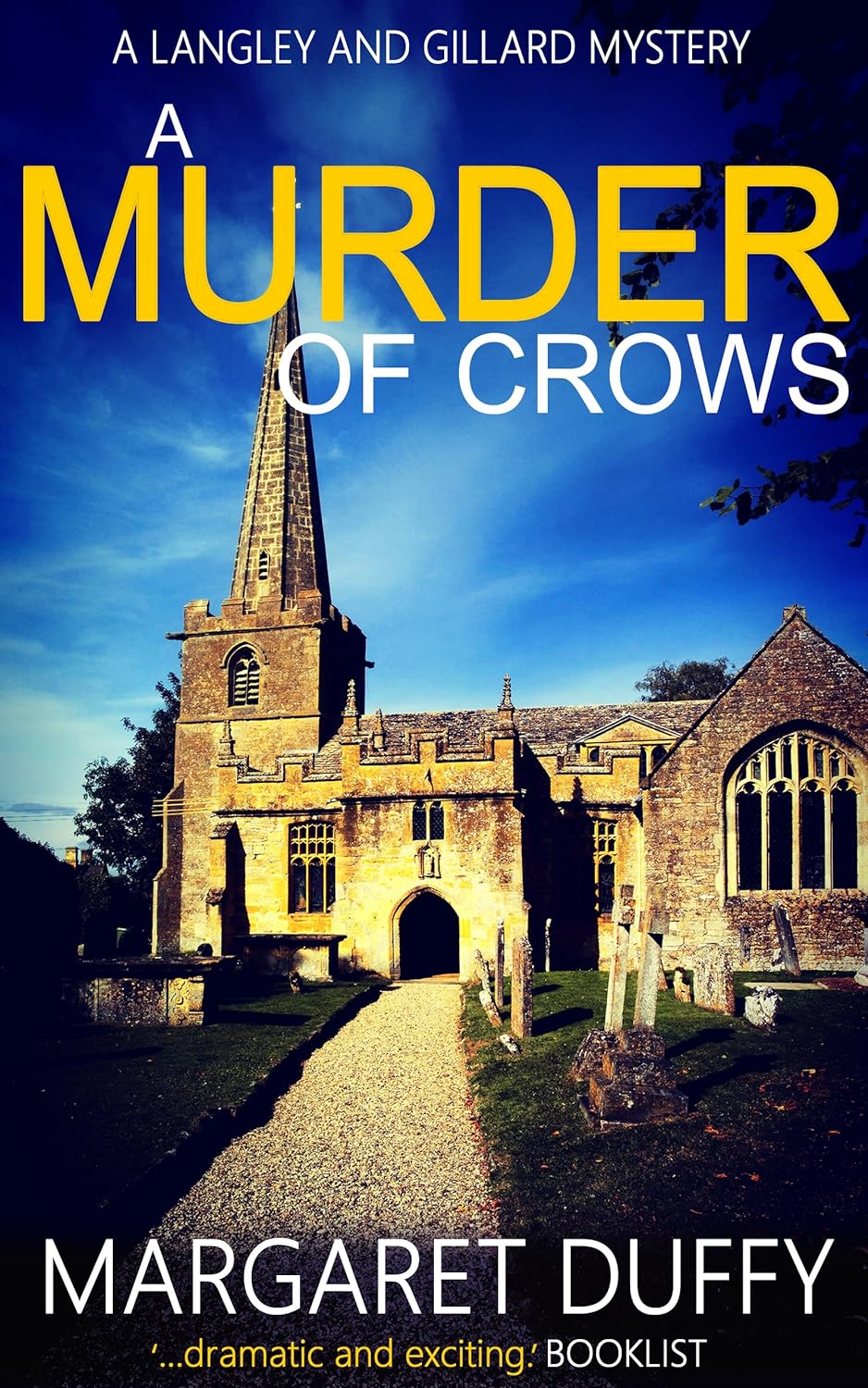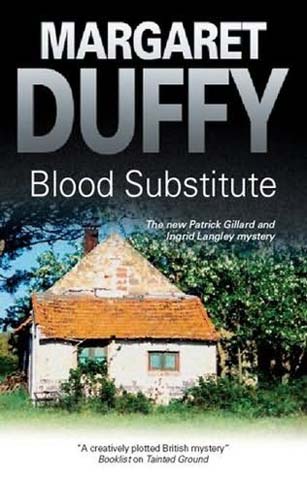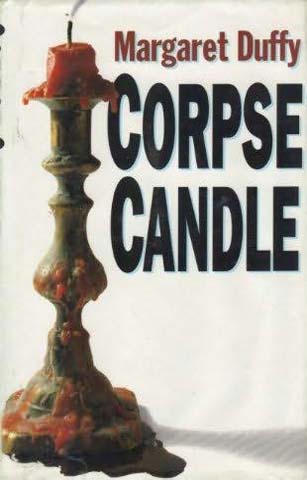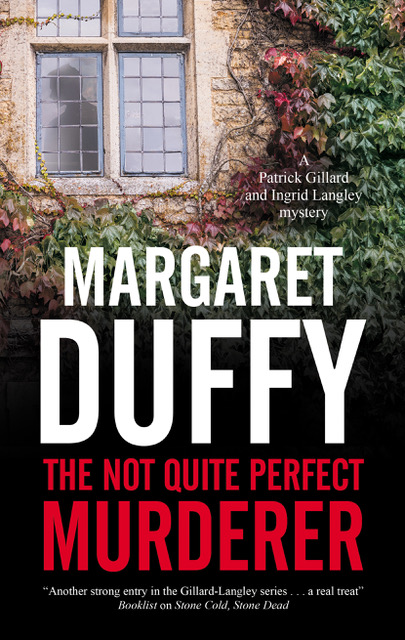Character Profiles
- Patrick Gillard
- Ingrid Langley
- Detective Chief Inspector James Carrick
- Joanna Carrick (née MacKenzie)
- The Reverend John Gillard
- Elspeth Gillard
Patrick Gillard
So who is Patrick Gillard? Is he based on a real person or merely a figment of an author’s imagination? The answer is both, he’s someone I met when I was a lot younger and about whom I shall say nothing more, a person who I have changed slightly, perhaps ‘embroidered’ is the right word, to form the character in my novels. The looks, thoroughly bad temper when driven too far and the amazing powers of mimicry I borrowed from the real man. My own invention when I started writing about him in the early eighties was making Patrick an army officer having an affinity with any weapon that was placed in his hands.
It’s not quite true that the character sprang fully formed into A Murder of Crows, the first novel I had published. He had appeared in two or three — I can’t remember exactly how many as it’s quite a long time ago — sci-fi novels that I wrote before that in the shape of one Ric Dancey. Dancey came out of the wallpaper — no, I know they don’t have wallpaper on spaceships — and was created to be a minor character in a tale about a prison satellite. He refused to be a minor character. In short, he took over the novel. Suddenly, without my seemingly having had any input, he had revealed that he was Major Patrick Gillard and that he was a security officer. When it became obvious that no one wanted to publish my science fiction stories I brought him back to the present day as he was simply too valuable to discard. End of story, only of course it was actually the beginning.
Badly injured in an accident with a hand grenade during undercover operations, not his fault, he was then recruited by a senior officer, Colonel Richard Daws, to work for MI5. Socialising while he recovered was among his initial duties; watching foreign diplomats, MPs and certain civil servants who the security services were interested in for various reasons. He was told to find a female working partner as it was thought that lone, somewhat saturnine, men were too obvious. All he could think of was to recruit, or rather beg, his ex-wife, Ingrid, to help him. They had always got on famously in public.
That’s where it all began.
Click here to go back to the top of the page
Ingrid Langley
Yes, they had always got on famously in public. Since they were married, that is. Before that – Ingrid and Patrick had met at school – they got on amazingly well all the time, mostly, Ingrid admitted to herself much later, because of sexual attraction. She was aware also that her only real claim to fame at school had been nabbing the highly desirable Head Boy. They fell in love when he turned up at her home to help her with her physics homework. This had come about as their fathers were friends and Ingrid’s had happened to mention that his daughter was struggling with a project she had to do in the school holidays. Ingrid’s father is dead now: she still misses him terribly.
By the time of the wedding Patrick was the youngest major in the Devon and Dorset Regiment and as someone remarked, ‘rising through the ranks like bread dough on a hot day’. But now there were too many exciting places to visit, too much to do, too many other challenges for him to have time to give much attention to his new wife who was by now a successful novelist. On the occasions when he was at home they quarrelled incessantly. He was haughty, big-headed, someone who thought he was quite, quite perfect. Also, he wanted children, Ingrid didn’t, not yet. What would happen to her writing career if she had to devote a lot of time to a demanding infant? And anyway, when was the child’s father going to be around? Finally, after one dreadful final row – in her view he was now utterly insufferable – when she had thrown his classical guitar down the stairs and smashed it, she threw him out as well. It was her cottage, she told herself, bought with her writing earnings and money left to her by her father.
It is an indication of this woman’s courage and determination that she succeeded in this as Patrick Gillard is not the kind of man to be tossed out of anything. In a word, formidable. They were divorced.
Then everything changed.
Serving with Special Forces, Patrick suffered catastrophic injuries and, as previously stated, was offered a job with MI5. He turned up on the Dartmoor cottage doorstep, limping, confidence shattered, thinking himself as good as destroyed, and begged her to help him in his new career with MI5.
Still furious but heartbroken by what had happened to him, Ingrid initially refused. Then, that same day, on orders from Colonel Richard Daws, Patrick’s new boss, several marines arrived to rough up Patrick to remind him that he was being paid and not achieving anything. There was a horrible skirmish when despite the odds Patrick beat them off with Ingrid’s help, she armed with a poker.
At that moment Ingrid’s life changed for ever as well. She accepted his offer – lots of material for novels of course, and having fallen in love a little with him again – not realising what her decision would involve. But the old magic of their relationship, strained sometimes, has kept them together –so far.
Click here to go back to the top of the page
Detective Chief Inspector James Carrick
Until relatively recently Carrick had thought that his father, a distant cousin of the then Earl of Carrick, was dead. His unmarried mother, Orla, had refused to talk about him as she felt betrayed by the man who had left her to fend for herself and her baby, only saying that he had eventually died in an accident at sea. James had assumed this to have been a fishing boat. Not so, it had been a racing yacht belonging to the earl and James’s father, on holiday, had been knocked overboard by the boom.
Robert Kennedy had not died. He had been washed up, more dead than alive, on a sparsely inhabited island and nursed back to a state where he could continue with his recovery elsewhere by a sympathetic crofter and his wife. He had then chosen to disappear from public view, the main reason for this being his job in an undercover police unit in London. Also, it had taken him a long time to regain full health and he had no idea he had a son.
Carrick then – his mother had chosen to change her name to that in defiance – was brought up mostly in Crieff where they went to live with an aunt, Orla’s parents, very strict Church of Scotland elders, having made life impossible for them at home. Later they moved to England where the young James did well at school and then set his sights on becoming a sports teacher. Very quickly becoming bored with that he joined the Metropolitan Police, serving, before getting married to Kathleen, in the Vice Squad. Later, he was able to get a transfer to the Avon and Somerset force, the reason for this being that his young wife was now suffering from a rare form of bone cancer and he wanted to get her out of the capital into the fresh air of the countryside.
Eventually, Kathleen died, leaving her husband desperately unhappy and relying more and more at work on his sergeant, Joanna Mackenzie. They began an affair, this before Kathleen passed away, she having said to him that she would understand if he did as her condition made it impossibly painful for her to make love. The Superintendant found out what was happening and, hating women on the job full stop, made sure that Joanna was transferred to a dead-end posting. She resigned (and it must be said here that I’m assured that this would not happen now.)
Eventually, Carrick did discover that his father was alive. Kennedy retired and, true to his reticent nature, is now living quietly somewhere in London, visited occasionally by his son. Old wounds take a long time to heal.
Joanna and Carrick eventually got married and have a little daughter, Iona Flora, who is cared for by a nanny as Joanna is going through her final training to rejoin the police.
Click here to go back to the top of the page
Joanna Carrick (née MacKenzie)
A feisty redhead, Joanna was at one time Carrick’s detective sergeant. She left the police after they had an affair, Carrick’s wife still being alive although suffering from a rare form of terminal bone cancer. They were very discreet but higher authority, who hated women in the job, got to hear about it through a local newspaper reporter and she was given a dead-end posting. She resigned and set herself up as a private investigator. Fate meant that she kept bumping into her old boss and several years later, after Carrick’s wife died, they married and, following the arrival of baby Iona Flora Joanna, rejoined the police.
Click here to go back to the top of the page
The Reverend John Gillard
John is Patrick’s father of course. At one time a Royal Naval Reserve Officer, he entered the church at the end of his service days and married Elspeth shortly after being ordained. They had met at a dance a couple of years previously while he was still in the Navy.
They were to have two children, both boys, Patrick and Laurence, the later nearly always referred to as Larry. For some reason Patrick was never called Pat or Paddy. No, never. Being completely different in temperament, the boys didn’t get on. Larry was rather a mummy’s boy, a teller of tales who got his brother into trouble on more than one occasion. They ended up fighting a lot, much to the despair of their parents. This animosity continued into their adult years, not helped by the fact that Larry married Shirley, an unpleasant woman, who hated Patrick. There was some kind of reconciliation only in later years, just before Larry was killed.
Always very supportive but at the same time expecting far too much of his surviving son, John was nevertheless extremely proud of him, Patrick rising to the rank of lieutenant colonel in the army, initially in the Devon and Dorset Regiment. (This has now been absorbed into The Rifles and it would not the be the first time an organisation he worked for was subsumed into another.)
Failing health in his seventies mainly due to overwork and not enough holidays has dogged John for a few years – he had heart surgery a while back. Sadly, he will not live to see his grandchildren grow up.
Click here to go back to the top of the page
Elspeth Gillard
Not all that long ago Elspeth discovered that she was descended from Cornish wreckers, which rather appals her. But as Ingrid, Patrick’s wife has said, referring to her husband’s aptitude for armed mayhem, ‘At least it shows where he got it from.’
A strong, intelligent and capable woman, Elspeth has been more than supportive to her family and also works tirelessly for local and national charities. On more than one assignment Patrick has turned up at home more dead than alive, returning to the one who can restore him. She will tolerate no criticism of him, not even when - recovering from serious injury in his service days but still in a lot of pain - he shot six rooks from the trees surrounding the church as they were keeping him awake. This is not to say that she offers no uncomfortable advice to him herself and as Ingrid, again, remarks, she is the only person on the planet who can actually make him wriggle with embarrassment.
I feel that Elspeth will continue to be a rock to her family for many years to come.




